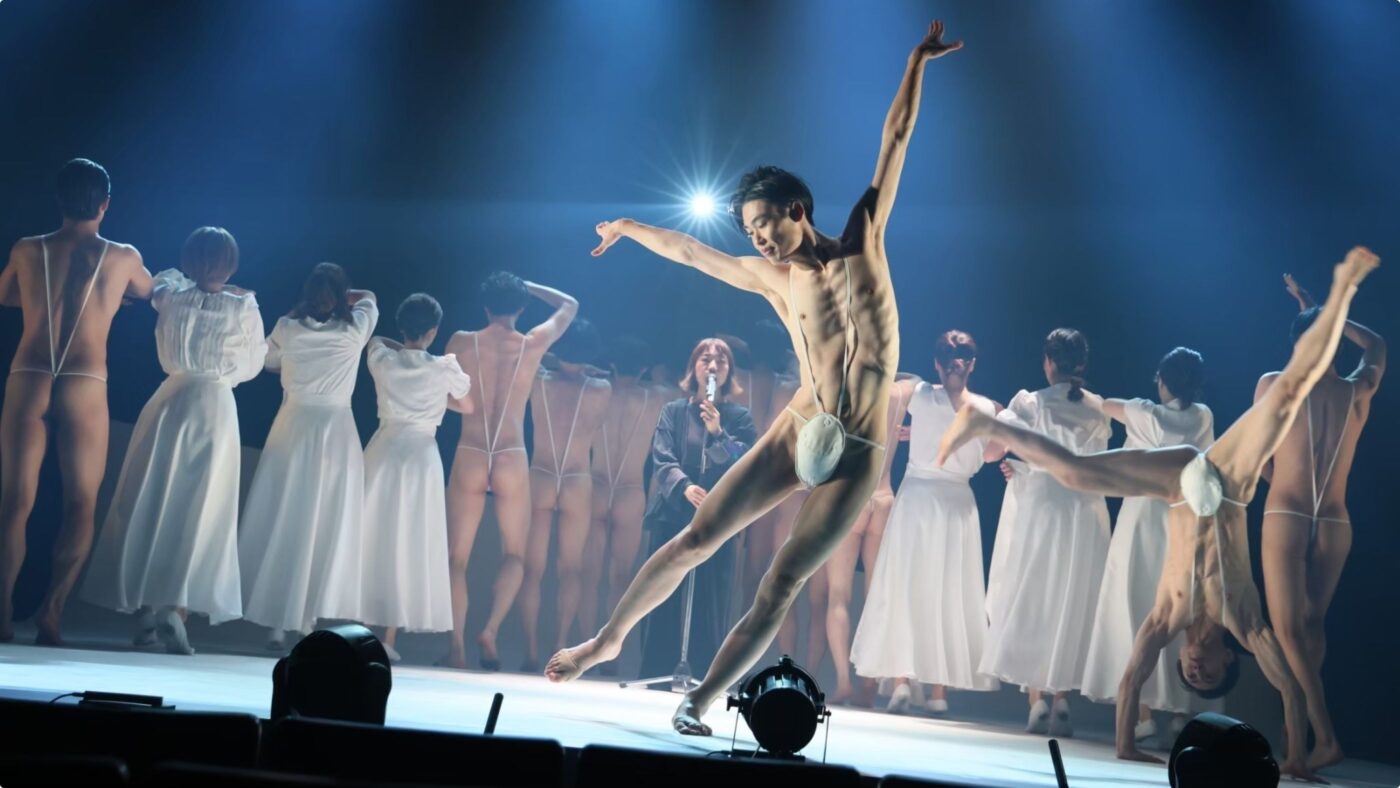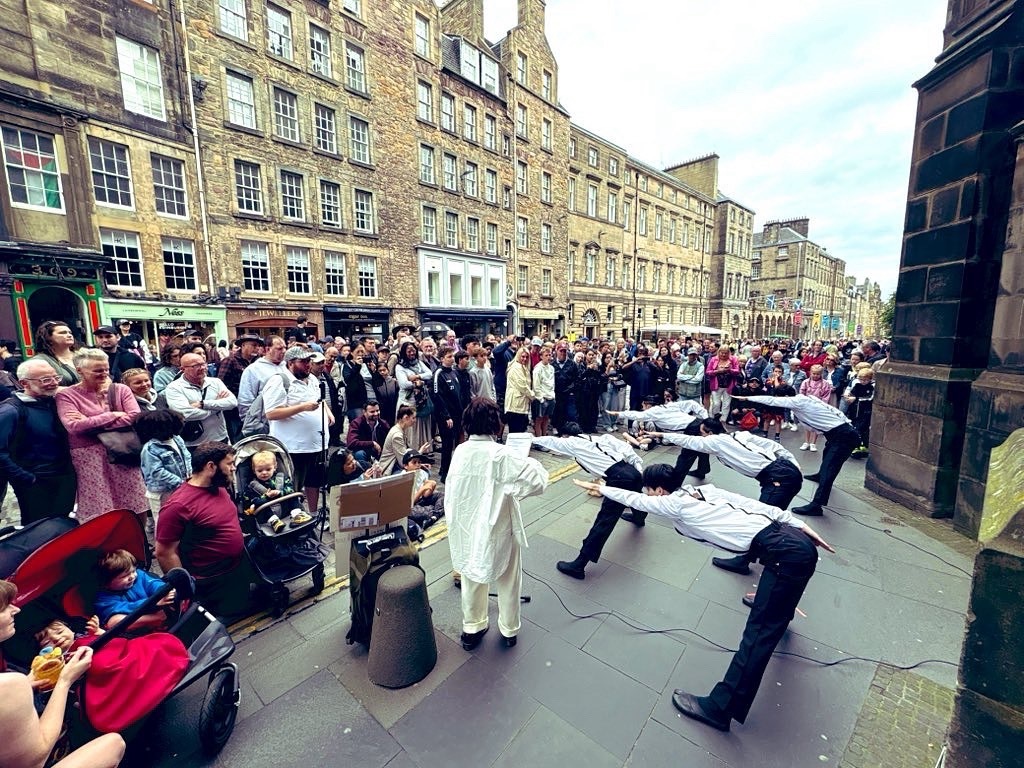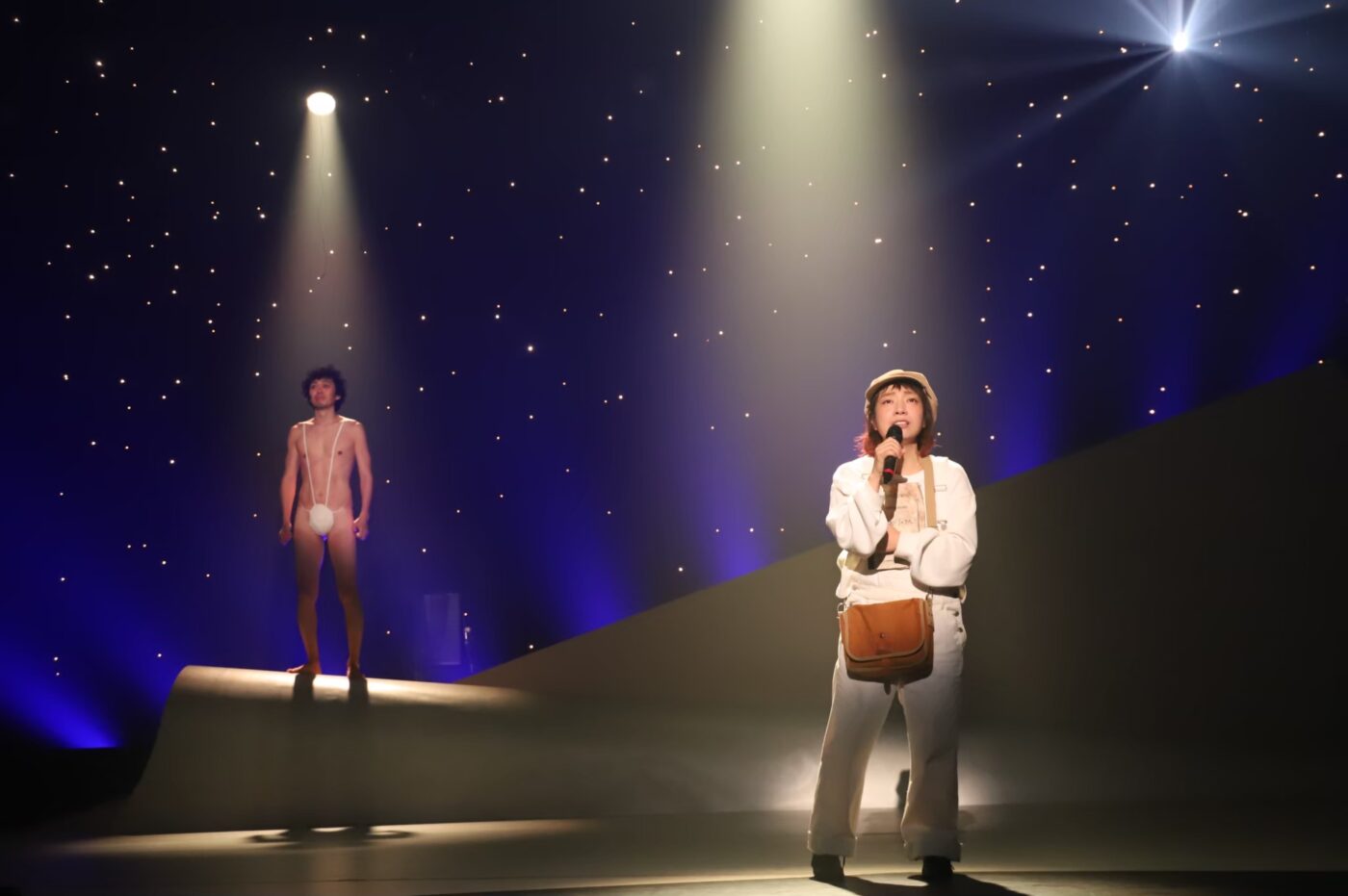Interview:
INSIDE JAPAN SELECTION
1 Shoulder pads - GALAXY TRAIN - Japanese musical theatre —

“Armed with nothing but our bodies”

The visual of practically naked men standing in line is unforgettable. The title “The Shoulder Pads” refers to shoulder pads—because that’s all the costume is. The actors are wearing nothing other than shoulder pads stitched together to cover the essentials: it’s an ultra-stripped-down approach to costume in theatre.
The show is Shika Goroshi’s first overseas venture at the Edinburgh Festival Fringe 2025, and runs from the preview on August 1 through August 23, at Greenside—an intimate venue near Edinburgh Castle with about 70 seats.
The piece, Night on the Galactic Railroad, is a 45-minute music theatre adaptation of the famous Japanese children’s classic by Kenji Miyazawa (1896–1933). It follows Giovanni, a bullied boy, who one night boards a mysterious train come down from the sky, accompanied by his childhood friend Campanella. Together, they embark on a surreal journey. This allegory of friendship, death, and the search for true happiness has been featured in Japanese school textbooks, reimagined as a film, and translated into multiple languages. This production stages it with only shoulder pads—covering just their groins.
Producer Sensha Takahashi describes the concept: “Fantasy works best when the audience’s imagination fills in the gaps. So, by presenting it in the most pared-down form, with the least visual information, it allows the audience to seamlessly complete the picture. At first the near-nudity might shock you, but before long you won’t even notice—and instead you can fully immerse yourself in the story.”
Although Shika Goroshi typically uses full costumes in most productions, around 2004 they began incorporating what they called “maebari”—a minimal garment adhered over the groin—as part of play-within-a-play or performance elements. Their first full play performed entirely wearing shoulder pads premiered in 2020: a double bill including Night on the Galactic Railroad. In the midst of the COVID-19 pandemic—when objects posed contamination risks and touring was difficult—they daringly staged this ultra‑minimal production. It became a hit, balancing laughter and tears. The show was revived in 2023, and the company has since added many children’s classics like The Wizard of Oz to their repertoire. Among these, Night on the Galactic Railroad—with its gentle music and bold physical storytelling—has been widely acclaimed as embodying the company’s originality and has become one of their signature works in Japan.
Takahashi says, “During the pandemic, when it became impossible to connect at close distance, we chose to use our physicality deliberately—it felt true to ourselves. This piece has special meaning for me, shaped by the context of its performance, and it is one of the most original expressions in our repertoire. At first glance, the visuals might feel exclusive, but once you experience it, you’ll sense its universal appeal.”
For the Edinburgh run, due to theatre constraints, they’re using a mix of English and Japanese onstage rather than subtitles. The cast, originally about twenty (men and women), has been streamlined to just six performers for this international version—making it much more austere than the Japanese version. Costumes, performers, and staff are minimal. There’s no promoter: they’ve built everything themselves. It is truly a journey abroad carrying nothing but their own bodies.
Full production in Japan
A single truck, communal living, guerrilla street performances

This bold leap into the international arena is typical of Shika Goroshi, who have always operated this way, standing out among Japanese theatre groups.
Founded in 2000 in Kansai by Natsuki Chobi (director) and Maruo Maruichirō (playwright/director) during their university days, the name “Shika Goroshi” was inspired by the sound of the words and Shiro Murano’s poem “Deer” (“Shika”). In their early years they performed works strongly influenced by Jūrō Karatani and Kōhei Tsuka, but gradually shifted to highly entertaining original productions.
In 2005 they moved their base from Osaka to Tokyo, lived together for two years, and performed over 1,000 street shows annually, drawing attention as “a troupe full of explosive energy.” They also maintained national tours of live performances and staged theatre productions. In 2010, they were shortlisted for the prestigious Kishida Kunio Drama Award. In recent years, while adding works aimed at children, they have continued to produce one or two major productions per year.
Though earlier pieces featured only a few songs, since 2008, actors have played brass instruments live onstage. It isn’t a backing band—the actors play themselves, believing that sound produced through the character’s breath matters. The role of music has since then increased, and in 2013 they officially designated a production as “music theatre.” Since then, their shows commonly feature over ten original songs.
Their view is that “song happens when emotion overwhelms”—so they generally don’t use songs to explain backstory. Though there are comedic moments, the focus often shifts to the characters’ suffering, and many pieces take some dark turns. Songs often express uncontrollable fear or sorrow. Combined with intense dance sequences, vibrant lighting, and spirited music, they create highly entertaining performances full of vitality.
They also run a junior ensemble system, regularly recruiting new young members. The company celebrated its 20th anniversary in 2020, and its momentum remains strong.
Takahashi joined as an actor in 2008 and he now oversees the overall production. Despite financial and logistical hardships during the pandemic, a single guiding moment acted as a turning point:
“When we toured Osaka in 2021, we stood in the lobby with masks on and hardly spoke. One woman in her sixties told me: ‘Since the pandemic, I have done nothing but go between home and work every day. But when I heard this play was coming to Osaka, I looked forward to it so much—it brought bright colour to my days filled with grey. Thank you so much for coming.’ At that moment I realised theatre can push people forward—and that encouraged us so much. Ever since, I’ve held those words in my heart, hoping we can be the strength people need for tomorrow.”
Dreams of international stage tents and more

In 2013, director Natsuki Chobi received a year-long overseas training grant from Japan’s Agency for Cultural Affairs and studied in Canada. Since then she’s had an international vision, and in 2025 this finally led to her overseas debut.
“We chose a work for Edinburgh that can transcend culture and language, sparking imagination. We hope to perform in other countries with local teams and casts—it is exciting to think of what new possibilities that might bring. We’re open to anything that feels fun. This piece, using the shoulder pads so distinctively, is perfect—but if there’s an opportunity, we’d love to present other works abroad, too. Originally, we were based in Osaka, not Tokyo, and have created works rooted in that different cultural sphere. It’d be wonderful to let people experience an aspect of Japan that’s different from Tokyo.”
Alongside their international ventures, the troupe also harbours further ambitions to stage tent theater in Japan. In the late 1960s, many theater companies in Japan performed in outdoor tents, attracting large crowds in packed tents, creating an electrifying atmosphere as audiences immersed themselves in the performances. However, such productions have become nearly nonexistent in recent years.
“Tent theatre is a vital part of Japanese stage culture, and we must preserve this tradition and spirit. I personally feel our company is an absolute match for that style.” They plan to build their own tent and perform it themselves. This style—creating excitement with nothing but their bodies—mirrors Shika Goroshi’s ethos. Someday, they might even tour abroad, carrying their tent with them.
Original Text by Momoko Kawano
Translated by SOIL Team

